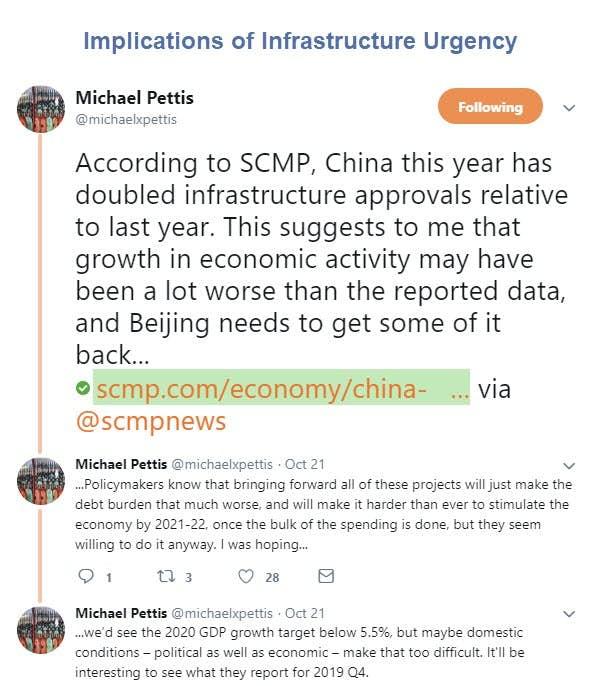China’s Growth Much Worse Than Reported, What About The US?
Authored by Mike Shedlock via MishTalk,
China doubles value of infrastructure project approvals to stave off economic slowdown amid trade war.
The South China Morning Post reports China Doubles Value of Infrastructure Project Approvals to Stave Off Slowdown.
The National Development and Reform Commission (NDRC) has approved 21 projects, worth at least 764.3 billion yuan (US$107.8 billion), according to South China Morning Post calculations based on the state planner’s approval statements released between January and October this year.
The amount is more than double the size of last year’s 374.3 billion yuan (US$52.8 billion) in approvals recorded over the same period, which included 11 projects such as railways, roads and airports.
Local governments have been under increasing pressure from Beijing to support the economy, but they have less budget room due to lower tax revenues after the central government over the past year ordered individual and business tax cuts.
To fill the gap, Beijing has allowing local governments to sell more special purpose bonds, whose proceeds can only be used to fund infrastructure projects. At the beginning of this year, the Ministry of Finance raised the quota for special bonds to 2.15 trillion (US$302 billion) from 1.35 trillion (US$190 billion) last year. And when local governments came close to exhausting their annual quota set this autumn, the central government brought forward a portion of their 2020 quota so they could continue to raise funding for new projects.
Infrastructure Urgency
Michael Pettis, Finance Professor, Peking University, and author of the China Financial Markets website has an interesting take infrastructure projects.
Allocation of Money
To fund the projects China Cuts Banks’ Reserve Ratios, Frees up $126 Billion for Loans.
Analysts had expected China to announce more policy easing measures soon as the world’s second-largest economy comes under growing pressure from escalating U.S. tariffs and sluggish domestic demand.
The People’s Bank of China (PBOC) said it would cut the reserve requirement ratio (RRR) by 50 basis points (bps) for all banks, with an additional 100 bps cut for qualified city commercial banks. The RRR for large banks will be lowered to 13.0%. The PBOC has now slashed the ratio seven times since early 2018. The size of the latest move was at the upper end of market expectations, and the amount of funds released will be the largest so far in the current easing cycle.
The broad-based cut, which will release 800 billion yuan in liquidity, is effective Sept. 16. The additional targeted cut will release 100 billion yuan, in two phases effective Oct. 15 and Nov. 15.
Real Growth
With real growth at probably half reported levels – which measure growth in activity, whether or not it is wealth enhancing – lower-than-expected growth rates are not a bad thing: they mean credit growth, while still too high, is slowing.https://t.co/s8aCyK2SOQ via @scmpnews
— Michael Pettis (@michaelxpettis) October 20, 2019
https://platform.twitter.com/widgets.js
World Bank has just cut its GDP forecast for China to 6.1% in 2019, 5.9% in 2020, 5.8% in 2021. For this to happen, debt-to-GDP ratios would have to rise by at least 12-15 percentage points, which I think is very unlikely. I’ll bet 2021 growth is below 5% (still way too high). https://t.co/1M5ljprfJW
— Michael Pettis (@michaelxpettis) October 10, 2019
https://platform.twitter.com/widgets.js
Trade Agreement
I suspect that the only thing driving “substantial progress” is election pressures in the US. I don’t think any agreement between Washington and Beijing will matter for more than few months.https://t.co/aRFimMFljZ
— Michael Pettis (@michaelxpettis) October 12, 2019
https://platform.twitter.com/widgets.js
Chinese Local Government Funds Run Out of Projects to Back
On October 16, the Fiancial Times reported Chinese Local Government Funds Run Out of Projects to Back.
“There are not many economically viable projects for us to take on,” an official at Sichuan Development told the FT.
“We have plenty of bridges and roads already.”
GDP Formula
GDP = C + I + G + (X – M)
GDP = private consumption + gross investment + government investment + government spending + (exports – imports).
Whether or not the projects are viable, government spending adds to nominal GDP.
If the government paid people to spit at the moon it would add to GDP.
Arguably, that’s a far better use than dropping bombs and making enemies in the process.
Not Writing Down Losses
I suspect that the only thing driving “substantial progress” is election pressures in the US. I don’t think any agreement between Washington and Beijing will matter for more than few months.https://t.co/aRFimMFljZ
— Michael Pettis (@michaelxpettis) October 12, 2019
https://platform.twitter.com/widgets.js
China isn’t writing down losses, but neither is the US, EU, or any other country.
With that in mind How Badly Overstated is Chinese and US GDP?
Concern over GDP with no concern over losses and malinvestment is concern over nonsense.
Tyler Durden
Wed, 10/23/2019 – 21:10
![]()
Zero Hedge’s mission is to widen the scope of financial, economic and political information available to the professional investing public, to skeptically examine and, where necessary, attack the flaccid institution that financial journalism has become, to liberate oppressed knowledge, to provide analysis uninhibited by political constraint and to facilitate information’s unending quest for freedom. Visit https://www.zerohedge.com

